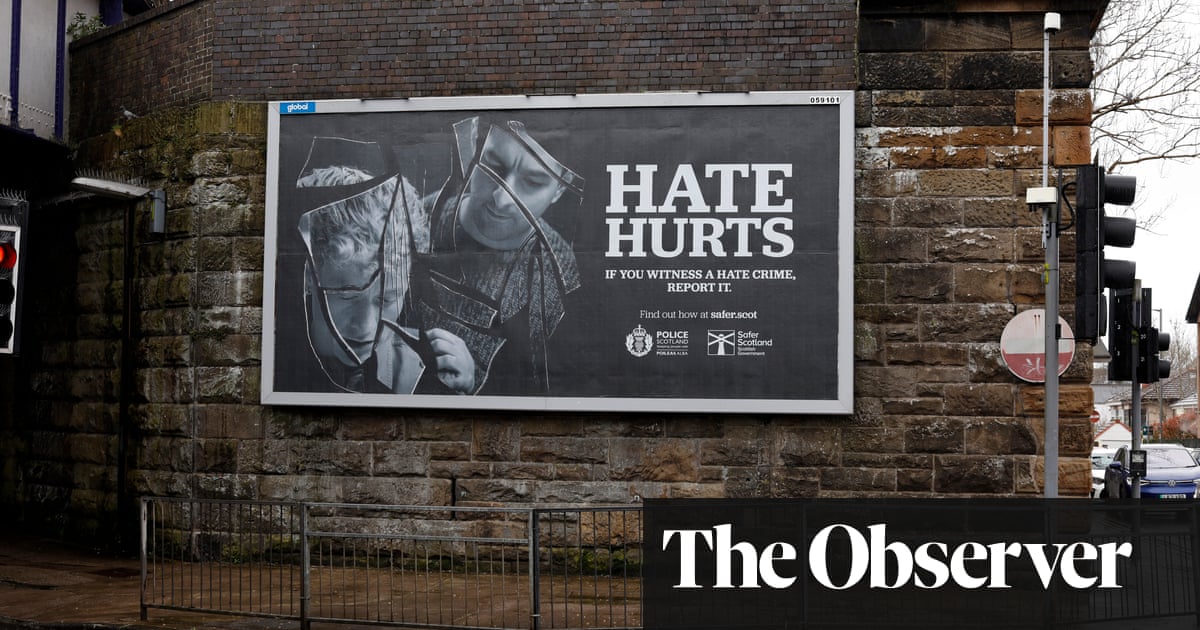
Humza Yousaf has hit back at “disinformation and inaccuracy” surrounding Scotland’s controversial hate crime act, after the Scottish Conservative leader, Douglas Ross, suggested the new legislation would result in “innocent people being prosecuted”.
Yousaf, Scotland’s first minister, said “a lot of disinformation” about the reach of the act had been “spread on social media, through some inaccurate media reporting, and by political opponents”.
There has been escalating concern that the new measures, which consolidate and expand existing hate crime offences, could be used maliciously against certain groups for expressing their opinions, in particular gender-critical feminists.
The law, which comes into force on 1 April, extends the offence of stirring up hatred, which has existed in relation to racial hatred since 1986, to other protected characteristics: age, disability, religion, sexual orientation, transgender identity and variations in sex characteristics sometimes known as being intersex.
Similar extensions in England to include religion and sexual orientation have been in effect since 2006 and 2008 respectively.
This week Elon Musk, the owner of the social media platform X, described the new law as an “example of why it is so important to preserve freedom of speech”, while a Downing Street spokesperson said Rishi Sunak was concerned about a “chilling” effect.
Ross, at first minister’s questions on Thursday, quoted the Scottish Police Federation’s description of the act as a “recipe for disaster” at a time when declining police numbers meant officers could barely deal with existing crime. The federation has also complained that its members have received only a two-hour online training package to deal with this complex and sensitive area.
Ross also quoted Rodney Dunlop, the dean of Faculty of Advocates, who has suggested the police may be swamped by vexatious complaints.
“People like JK Rowling could have the police at her door every day for making perfectly reasonable statements,” Ross said.
The author and activist has already faced threats from individuals who disagree with her gender-critical stance to lodge complaints about her with Police Scotland from 1 April. But Rowling has countered: “If you genuinely imagine I’d delete posts calling a man a man, so as not to be prosecuted under this ludicrous law, stand by for the mother of all April Fools’ jokes”.
Yousaf insisted there was a “very high threshold” for prosecution and a “triple lock” on freedom of expression in the act.
He referred extensively to a newspaper column published on Thursday morning by Adam Tomkins, a former Tory MSP and convener of Holyrood’s justice committee, who was closely involved with the passage of the bill in 2021.
Tomkins insisted that “offensive speech is not criminalised by this legislation … just because you feel offended by what someone has said does not make it a hate crime”.
He wrote: “Asserting that sex is a biological fact or that it is not changed just by virtue of the gender by which someone chooses to identify is not and never can be a hate crime under this legislation.”
Police Scotland has firmly rebutted reports that comedians and actors would be targeted through enforcement, and earlier on Thursday the chief constable, Jo Farrell, told a meeting of the Scottish Police Authority that officers would apply the law “in a measured way, using their discretion and their common sense”.
There is also continuing criticism that the law does not include women, while a promised new misogyny law to crack down on street harassment and organised online hate has yet to be put before Holyrood.












